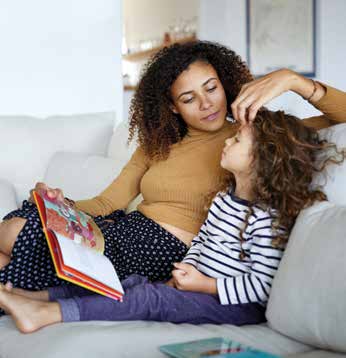Children's anxiety
You and your child can learn to manage anxiety
Even during tough times, you can bring on the calm
Children have fears, worries and sadness as they grow up. This is normal. But, if those feelings are frequent, your child may have anxiety. You can learn the symptoms. And, how to address them.

![]()
All kids deserve access to good mental health care. It's how they'll make better sense of their world.
Spot the signs
Anxiety can show up in different ways, including:
- Trouble with sleep, mood swings and irritability
- Lack of focus, confidence or presence in daily situations
- Frequent headaches, upset stomach or lack of appetite
- Fear of time (or distance) away from a parent or caregiver
- Fear that something bad will happen
- Fear of dogs, people, bugs, places and objects
- Refusal to go to school
Everyone has their own sense of anxiety, and your child may feel only some of these things. What matters is that your child can share concerns with you and get help.
Get support
Anxiety can have many causes, so let your doctor know what’s going on. It's not always easy for kids to express their feelings. They may feel afraid to tell another person about concerns or issues.
The doctor may suggest your child visit with a therapist. That could open a safe place for your child to talk about their fears and worries. Plus, you and your child can get important tools and life skills.
Also, try these tips to help your child manage challenges.
10 tips to help your anxious child:
- Pay attention to them
- Let them know you're there to help
- Don't dismiss how your child feels
- Help your child take deep breaths
- Try to stick to a routine, but stay flexible
- Allow extra time and avoid rushing, such as before school
- Prepare healthy meals and reduce the sugar they eat and drink
- Make sure your child gets exercise and enough sleep
- Share calm time with books, art and laughs
- Try to stay calm and take care of yourself
Learn more about behavioral health services
If your child ever tells you that they're thinking about causing harm to themselves or others, get help right away.
988 - Dialing Code for Suicide and Crisis Lifeline
- For people aged 10-34, suicide is a leading cause of death
- Additionally, from April 2020 to 2021, over 100,000 died from drug overdoses
- 988 dialing code goes live July 16, 2022 – providing direct connection to National Suicide Prevention Lifeline's network of over 200 local crisis centers which provider 24/7 support to people in suicidal crisis, emotional distress, or substance use crisis

![]()
It's not your fault.
Your child's anxiety doesn't make you a bad parent. In fact, you can strengthen the bond with your child in these tough moments.
